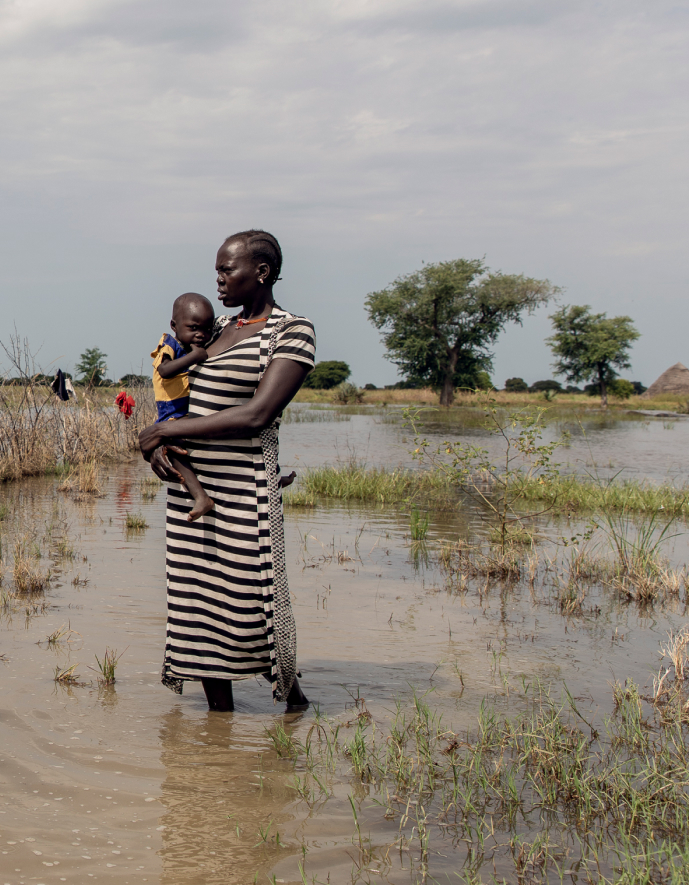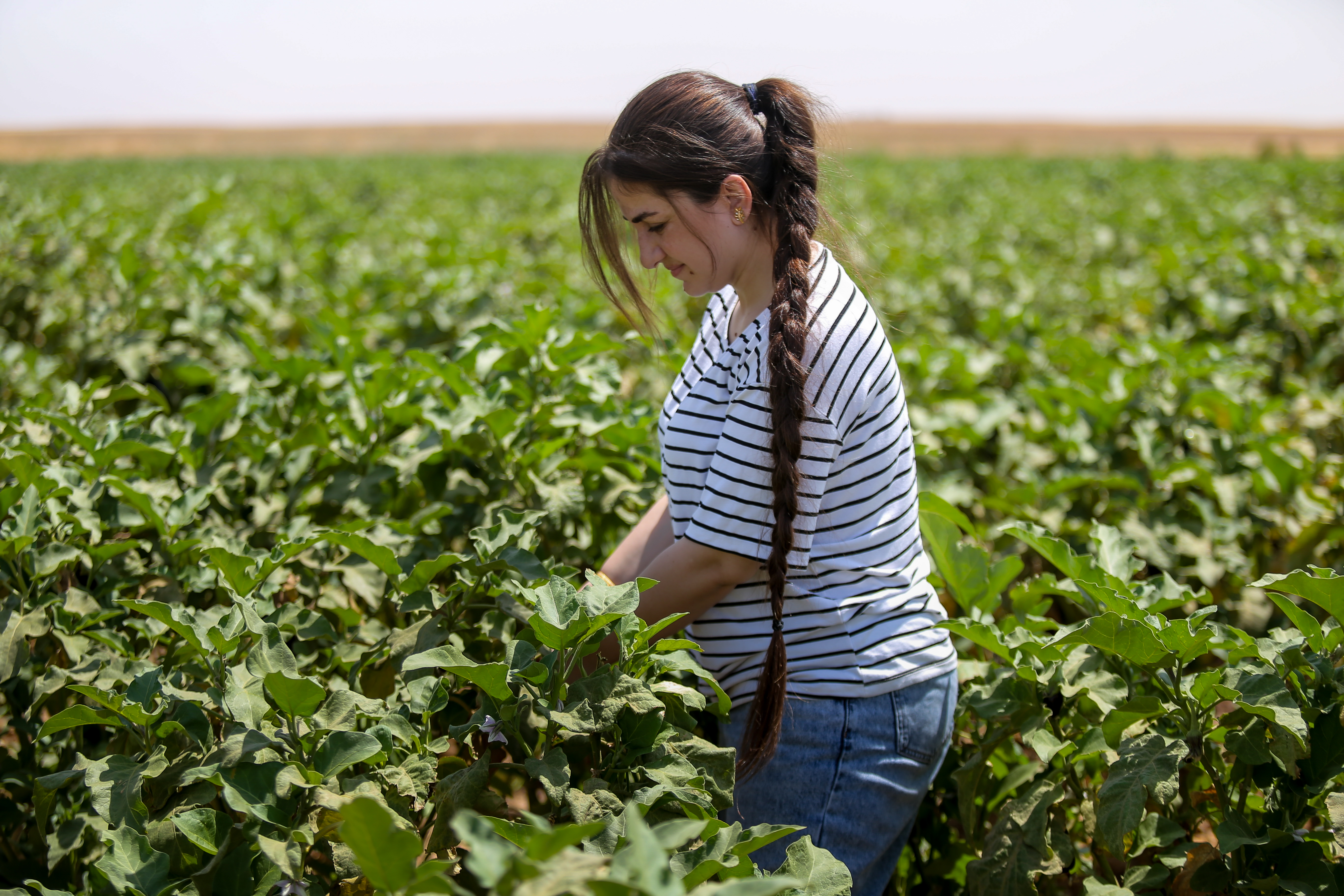
Building Climate Resilience
We are building the climate resilience of communities affected by conflict and crisis.
The Problem
In the crisis-affected places where the IRC works, the climate crisis is already the current reality. Despite people in these vulnerable countries having done the least to contribute to the climate crisis—and being the least prepared for its impact—they are on the frontlines and reeling from its effects. More frequent and intense natural disasters and extreme weather are destroying livelihoods, intensifying conflicts, uprooting people from their homes, and exacerbating already dire humanitarian crises. In many of these countries, well over half the population depends on agriculture for their livelihoods. In these communities, climate disasters like droughts and floods reduce harvests and dismantle infrastructures already burdened by conflict.
Why current approaches are inadequate
Current approaches are inadequate. Current humanitarian and climate financing is not reaching those who need it most. In fact, the more fragile a country is, the less climate finance it receives. While promising innovations in agriculture exist, most of those solutions are designed for stable contexts, and depend on systems that haven’t been disrupted by conflict and crisis. We simply can’t copy and paste solutions that work for more stable environments, and new approaches are urgently needed to build the resilience of these communities.


Our solution
We are hard at work in conflict-affected countries that are the most vulnerable to climate change. Our teams understand the unique needs of people in these settings and are focused on climate adaptation, and climate resilience. Our work includes building resiliency of agricultural livelihoods in the most fragile and climate vulnerable areas, anticipatory action to climate hazards, supporting community-led natural resource management and water conservation, and training people in sustainable livelihoods—all while putting the needs of women and girls at the center of our work.
Shifting the status quo
Without new innovations and solutions that address the complex realities of fragile states, we will continue to see diverging outcomes in stable vs fragile settings. By building the evidence base for these solutions, we aim to catalyze a shift in the aid sector in how climate financing is directed and where it’s delivered.
Related Projects
Cities at the forefront of conflict and climate migration: Mitigating the risks of conflict over urban land and water in fragile contexts
Forced migration and displacement are re-shaping cities and countries across the globe. More people are displaced by conflict and natural disaster today than at any point in history and the percentage of world population displaced is increasing. Climate change is widely recognized as a contributing and exacerbating factor in migration and in conflict. When people flee, in most instances it is not across borders but rather to closest cities. While much climate change research is focused on the push-factors for displacement, less is known on locations of settlement and the solutions to mitigate negative impacts and harness positive impacts of migration. Cities are at the forefront of responding to climate migration, yet many are ill-prepared and under-researched to manage growing urban populations. This study aimed to contribute to improving inclusive and equitable natural resource management in fragile and conflict-affected urban and peri-urban contexts affected by internal migration through enhancing knowledge of how displacement affects the governance of natural resources in these areas and identification of promising approaches in addressing problems that may arise. A literature review was completed along with a participatory comparative case study research in Maiduguri, Nigeria and Bukavu, Democratic Republic of Congo (DRC).
Explore ProjectCommunity-based Anticipatory Action for Climate Change in Urban Areas
Pilot testing and evaluating an anticipatory action model for recurrent, low-impact climatic shocks (e.g. seasonal flooding) that utilizes local resources and strengthens partnerships between affected communities and local authorities.
Explore ProjectDisaster Risk Reduction Exploratory Design Research
Supporting farmers and pastoralists in conflict-affected contexts to prepare for, respond to, and recover from disasters
Explore ProjectImpacts of anticipatory cash to small-holder farmers and livestock owners in Northeast Nigeria
The overall positive impacts of anticipatory cash to small-holder farmers and livestock owners in Northeast Nigeria in advance of forecasted climatic shocks.
Explore ProjectLivelihoods Transformation
Supporting agro-pastoralists in crisis-affected contexts to uncover and access new livelihood and mobility pathways when the old ones are no longer viable.
Explore ProjectFarmer Seed Stewardship Network
Ensuring farmers in conflict-affected contexts have access to quality climate-adapted seeds.
Explore Project
Latest Updates
-
Climate-resilient seeds offer farmers in Syria a path to food security
Boosting local seed production and promoting climate-resilient varieties could also be transformative for women farmers in the region.
External link -
Seed Security in Fragile and Climate Vulnerable States: System Disruptions and Solutions for Niger, Pakistan, South Sudan and Syria
Extreme weather and disasters due to climate change aren't a distant reality— the conflict-affected communities in which the International Rescue Committee (IRC) works increasingly represent the epicenter of the climate crisis today.
External link -
Climate Action for the Epicenter of Crisis: How COP28 Can Address the Injustices Facing Conflict-Affected Countries
The three global challenges of climate change, extreme poverty and conflict are converging to form a new epicenter of crisis.
External link